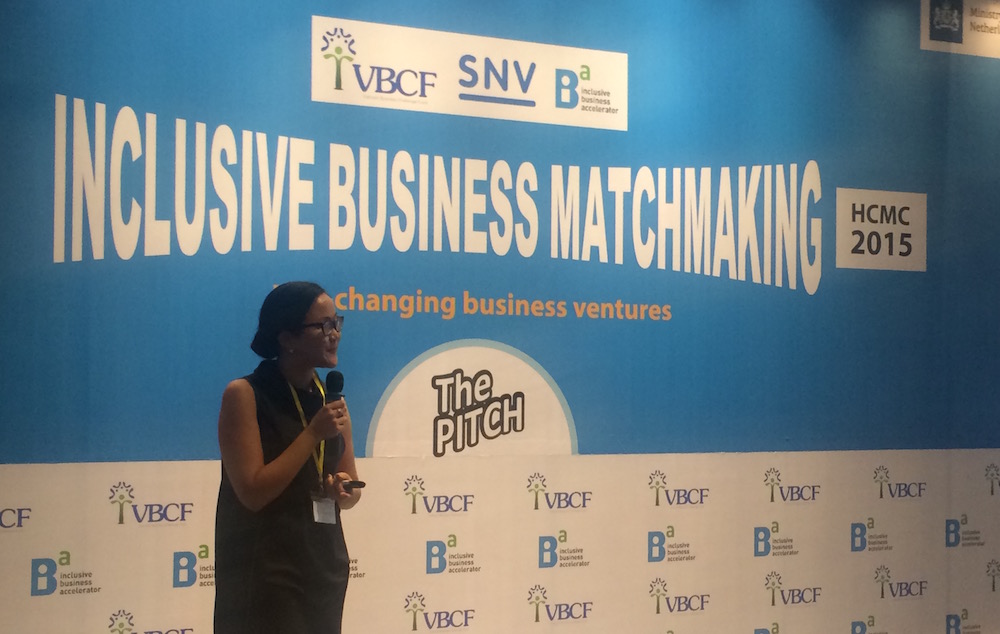It would be great to see successful exits in the impact space that really prove out our thesis at Unitus Impact

Part of our work at the Inclusive Business Accelerator is building networks of inclusive business entrepreneurs, BDS professionals and impact investors. Shuyin Tang belongs to the last group as she is working in Southeast Asia for venture capital firm Unitus Impact. We contacted Shuyin to hear more about the fund and their activities.
Can you introduce Unitus Impact, and explain what your role is within the organisation?
“Unitus Impact is a venture capital firm with the dual mission of improving the livelihoods of the working poor and providing strong financial returns to its investors. We are in the process of closing a USD ~45m fund – the Livelihood Impact Fund – for Southeast Asia and India.
We invest in scalable companies that increase incomes and improve the livelihoods of the working poor by linking underserved populations to formal markets, engaging the working poor as suppliers or distributors, and/or providing underserved consumers with products and services that improve their lives.
Our typical investment size is USD 500,000 to 2 million, structured as equity or convertible debt. Our HQ are in San Francisco, and we have a team of investment professionals on the ground in India, Indonesia and Vietnam. I’m based in Hanoi, Vietnam, and lead our investment activities in Vietnam and the Philippines.”
How is Unitus Impact different from other impact funds?
“Well, actually there’s only a handful of other impact funds in Southeast Asia. It’s still a nascent market for impact investing and one of the reasons why we’re excited to be closing the Livelihood Impact Fund is that we hope to prove out a relatively novel investment thesis for the region and attract more capital into the space.
Each impact investor will define impact differently, and for us, we have a very clear focus on livelihoods, that is: how do we increase the incomes of the working poor and/or provide them with better access to essential goods and services?
We’ve seen that the kind of companies that most effectively achieve these goals are usually linked to improving supply chains and building innovative distribution platforms. One other thing to note about us is our goal of achieving strong, risk-commensurate financial returns, in line with commercial investors in the region.
We hope that the economic success of the fund, alongside its measurable social impact, will encourage a wider group of investors to consider the advantages of impact investing, and more specifically, investing in companies focused on improving livelihoods.”

What do these supply chain and distribution companies add?
“These companies can take many forms – on the supply chain side we’ve been looking at several vertically integrated agriculture companies working from ‘farm-to-fork’ to increase yields and prices, reduce costs and wastage, and ultimately improve the income of smallholder farmers.
Agriculture is definitely an exciting and impactful area, with up to 75% of the working poor still relying on agricultural supply chains for most of their income in our target countries. On the distribution side, there’s again a huge range of business models but we often target distribution platforms that address the inefficient ‘last mile’.”
Why do you focus on India, Indonesia and Vietnam especially?
The fund’s target geographies – India, Indonesia, Vietnam and the Philippines - are characterized by significant economic growth, high density of low-income populations with growing purchasing power, and robust economies that provide strong opportunities for exit via acquisition or sale to local or multinational companies looking to expand their reach. While these are our focus countries, we are certainly open to investing in other Southeast Asian countries, such as Thailand.”
Can you describe your investment portfolio and highlight one company you think is a good example of what you are looking for?
Currently we’ve made eight investments across the region and hope to close a further two by the end of the year.
One of our portfolio companies is iCare Benefits, headquartered in Ho Chi Minh City, Vietnam. iCare Benefits provides an employee benefits solution centred around making life-essential goods and services accessible to low-income factory workers via an innovative distribution platform and 0% interest payment plans. iCare partners with factory management and employee unions who sponsor participation in the iCare program and agree to facilitate monthly salary deductions.
Through these integrated factory partnerships, iCare Benefits allows workers to use low-cost credit to access high-quality products and customer service for the first time, and provides iCare with an efficient collection platform. Employers benefit from increased employee morale and retention while employees benefit from access to affordable goods and credit.”
What are the first things you look at when you discover a company that might fit your investment criteria?
